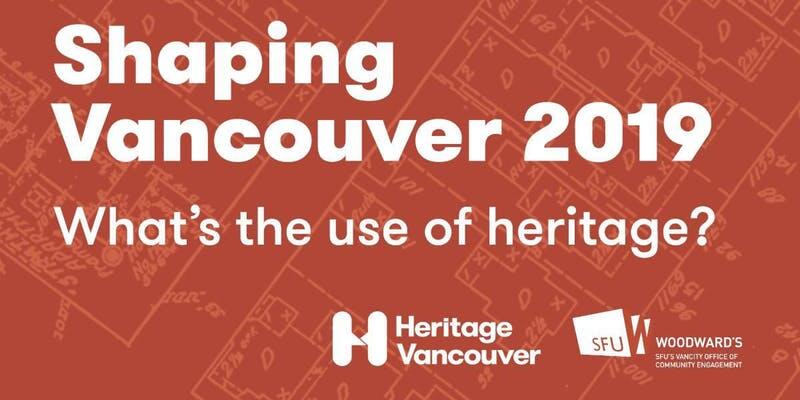
07:00 PM - 09:00 PM
About the event
In this session, we are excited to welcome these panelists to share their insights:
Michael Gordon – Former Senior Downtown Planner, City of Vancouver, Vancouver Heritage Commissioner
A year ago, City Council appointed Michael to the Vancouver Heritage Commission. Until 2018, he was Senior Downtown Planner for the City of Vancouver primarily focused on planning in the downtown peninsula and the West End. He has been an Adjunct Professor teaching Housing and Community Planning Policy at the University of British Columbia for 18 years. He was elected President of the Canadian Institute of Planners in 2013 and previously served as the Vice-President of the Planning Institute of BC. He has presented and written extensively on urban history, design, planning, music policy, skateboarding, demographics and housing. Currently, he is is shooting a documentary on the history of live music venues in Vancouver with Mark Pickersgill. He has been invited to speak and advise on urban issues in Berlin, New York, Seattle, Philadelphia, Portland, Memphis, Atlanta, Fort Worth, Toronto, Montreal, Vancouver, Halifax, Los Angeles and other cities. He has also received a number of awards for achievements in planning and his volunteer contributions to the planning profession and community-based planning.
Elijah Sabadlan – Heritage Consultant & Conservation Specialist
Elijah views heritage architecture as palimpsest in the continuing evolution of urban environments. As a Heritage Consultant with Donald Luxton & Associates, he provides heritage design and technical advice to the project team, from planning to construction. Recent projects include the preservation of the Old Stock Exchange Building Heritage Elevator Lobby, conservation planning for the Vancouver Post Office, and establishing a Conservation Guidelines for the Sinclair Centre. Other notable past conservation projects elsewhere include: the Broadview Hotel (Toronto, ON); the Imperial Oil Building lobby and Deer Park United Church (Toronto, ON); One Spadina Crescent (Toronto, ON); and Cultural Background Report for Port Union (Trinity Bay North, NL).
As an active member of the Canadian Association of Heritage Professionals (CAHP-ACECP) and its BC Chapter (BCAHP), Elijah uses his knowledge and expertise to build capacity and to facilitate conversations on conservation.e
Carmel Tanaka – Founder, Cross Cultural Strathcona Walking Tour
Carmel Tanaka was born and raised in Vancouver, Canada on the unceded territory of the Musqueam, Squamish and Tsleil-Waututh people to an Israeli mother and a Japanese Canadian father. She holds a Master’s Degree in Emergency and Disaster Management from Tel Aviv University. Her specialties are organizational disaster management, partnership building and community development with experience in Australia, Canada, and Israel. Carmel's pro-diversity stance and open door policy stem from valuing both sides of her heritage, which she describes as "Jewpanese". This base provides Carmel with the ability to sensitively manage and effectively mediate challenging projects involving multi-generational intersectional groups with mixed political, religious and social opinions. She has founded and leads: the Cross Cultural Strathcona Walking Tour, Genocide Prevention BC, and JQT Vancouver (Jewish Queer Trans*). She was recently appointed to the Japanese Canadian Internment BC Redress Strategy Team by the National Association of Japanese Canadians.
Kamala Todd – Indigenous Arts and Culture Planner, City of Vancouver
Kamala Todd is a Metis-Cree mother, community planner, filmmaker, curator, and educator born and raised in the beautiful lands of the hən̓q̓əmin̓əm̓ and Skwxwú7mesh-speaking people, aka Vancouver. She has a Masters degree in Geography (UBC) and is the City of Vancouver’s first Indigenous Arts and Culture Planner. Kamala’s film credits include Indigenous Plant Diva, Cedar and Bamboo, RELAW: Living Indigenous Laws, and Sharing our Stories: the Vancouver Dialogues Project. She is the author of “This Many-storied Land”, in In This Together: Fifteen Stories of Truth and Reconciliation (2016), and Truth-Telling: Indigenous perspectives on working with Municipal Governments (2017) for Vancouver Park Board.
OVERVIEW
When we think of our city as a whole, it is important that it sustains a strong sense of identity for the diversity of people who live here.
One important use of heritage would be to present the multiple layers of stories across the city so that we can experience the areas of Vancouver in a variety of ways.
The recent City of Vancouver Arts and Culture Plan proposes actions for the incorporation of new approaches to both intangible and tangible heritage. For the purposes of ongoing cultural vitality, redress and equity, it also proposes integration of intangible heritage into the City’s existing heritage program which up to now has mainly focused on the preservation of buildings.
This idea is consistent with best practices in heritage where it is not a standalone silo but approached as a part of culture, integrated into city planning for the purposes of economic, social and environmental sustainability.
Our final talk for 2019 will look at the opportunity for how a new City-wide plan might carve out a larger role for heritage and integrate current heritage thinking into a wide range of the City’s social aims.
Location: SFU Woodwards
49.282372, -123.10858
SFU Woodwards
149 West Hastings Street
Vancouver, BC
Canada